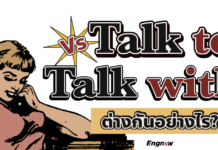ทุกคนมีกิจกรรมที่ทำบ่อยๆ ซ้ำๆ ในทุกวันหรือกิจวัตรประจำวันนั่นเอง มาดูกันค่ะว่าถ้าเราอยากพูดถึงกิจวัตรประจำวันของเรานั้น ต้องใช้โครงสร้างอะไร
1. I spend a lot of time on …. (+ Noun / V-ing) :
ตัวอย่างเช่น
I spend a lot of time on reading books.
= ฉันมักจะใช้เวลาไปกับการอ่านหนังสือ
I spend a lot of time on video games.
= ฉันมักจะใช้เวลาไปกับวิดิโอเกม
2. Subject + (often) tend to…( + V-inf) :
ตัวอย่างเช่น
It tends to get very cold here during the winter.
= ที่นี่มักจะมีอากาศเย็นในฤดูหนาว
Children tend to prefer sweets to vegetables.
= เด็กๆ มักจะชอบของหวานมากกว่าผัก

3. You’ll always find me + V-ing :
ตัวอย่างเช่น
You’ll always find me reading a book before going to bed.
= คุณมักจะพบว่าฉันอ่านหนังสือก่อนนอนทุกคืน
You’ll always find me practicing in the fitness center at 7 pm.
= คุณมักจะพบว่าฉันมาฟิตเนสเซนเตอร์หนึ่งทุ่มทุกวัน
4. (V-ing) is a big part of my life :
ตัวอย่างเช่น
Spending time with my child is a big part of my life.
= ส่วนใหญ่ในชีวิต ฉันมักจะใช้เวลากับลูกๆ
Watching news on TV is a big part of my life.
= ส่วนใหญ่ในชีวิต ฉันมักจะดูทีวี
5. I have a habit of + V-ing :
ตัวอย่างเช่น
I have a habit of playing with my hair when I’m nervous.
= ฉันมักจะเล่นผมตัวเองเวลาตื่นเต้น
อ่านต่อ “มาแชร์ประสบการณ์ Resignation หรือการลาออกในภาษาอังกฤษ “
อ่านต่อ “10 คำถามยอดฮิตที่คุณต้องเจอแน่นอนในการสัมภาษณ์งาน”
อ่านต่อ “Everyday expression คำศัพท์ สำนวนง่ายๆ ที่ใช้ได้ทุกวัน”












